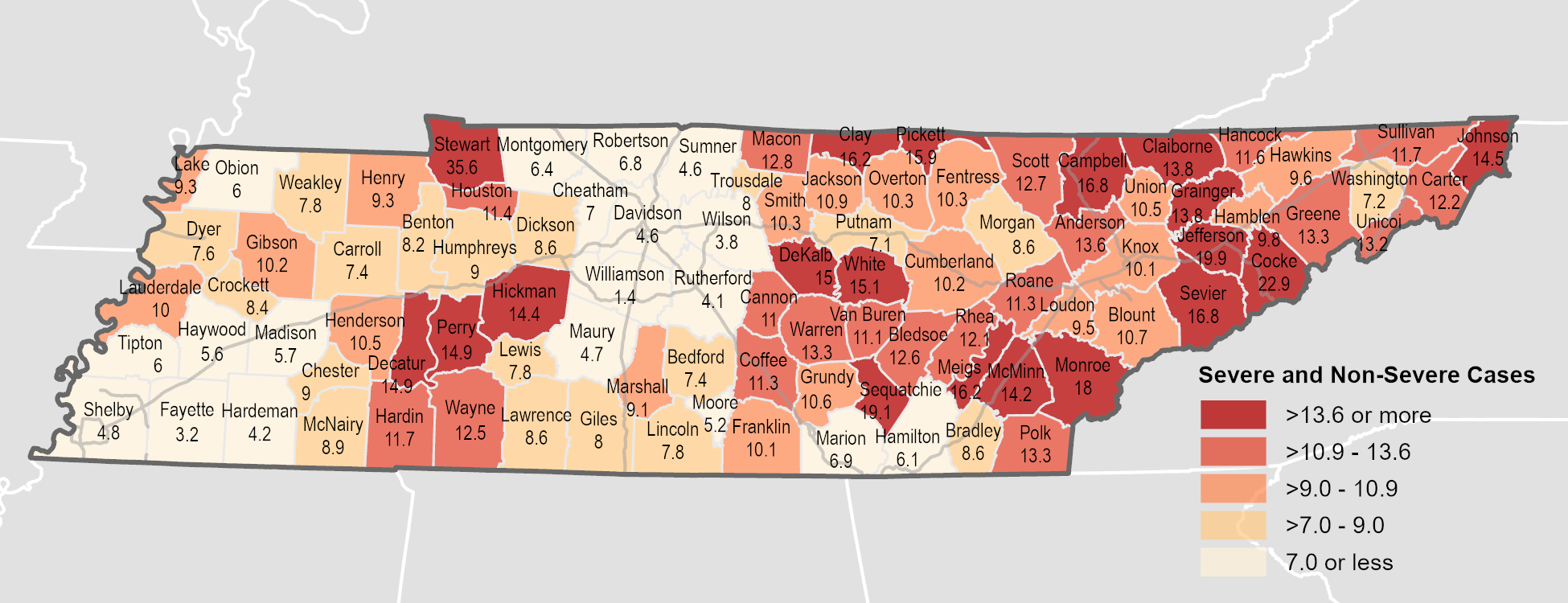A new study by the Boyd Center for Business and Economic Research at the University of Tennessee, Knoxville, finds a one-in-eight chance that a child born in Tennessee will be a substantiated victim of abuse or neglect by the time they reach adulthood. These new findings show that child abuse and neglect carry significant economic costs in addition to their devastating personal and social consequences.
The Economic Impact of Child Abuse and Neglect in Tennessee, written in partnership with the Tennessee Commission on Children and Youth’s Second Look Commission, finds that the lifetime cost of child abuse is over $285,000 per case and that child abuse costs the state between $3.33 and $4.97 billion per year. This includes the cost of child mortality and premature adult mortality, decreased wages and workforce productivity in adulthood among survivors, increased medical costs both in childhood and adulthood, increased demands for special education, residential care costs of dependency and juvenile delinquency, and the cost of criminality in adulthood.
Economic Impact of Child Maltreatment in Tennessee
Efforts to prevent maltreatment and help victims recover will not only decrease these costs but also yield a lifetime of benefits including greater labor force participation, improved population health, decreased rates of substance use disorders, lower incarceration rates, reduced demand for state services and greater life expectancy.
“Economically, there is a strong case for additional resources being made available to help victims of child abuse and neglect receive therapy and recover,” said Matt Harris, Boyd Distinguished Professor of Health Economics and author of the study. “However, we must acknowledge that therapy and treatment will only partially offset the economic and personal harm done. Since the economic harm from child maltreatment manifests over the individual’s life, so would the benefits from therapy and treatment. Therefore these efforts would need to be viewed as a long-term endeavor from an economic perspective.”
Maltreatment is divided into four types in the study — physical abuse, sexual abuse, drug exposure and neglect — and categorized as severe or nonsevere. From 2019 through 2022, data from the state Department of Children’s Services shows an average of 11,668 children a year who were first-time substantiated victims of abuse or severe neglect. The study focuses only on first-time substantiated victims to prevent double-counting children who are victims in multiple years.
Although DCS receives $1.35 billion in funding from state and federal funding and other sources, most of that money goes toward crisis management, residential placements and foster care. There were 163,465 reports of abuse to Child Protective Services in 2022, and 70,718 cases or assessments were opened based on those initial reports. The CPS budget allows for 832 case managers, but state law allows only 20 open cases per case manager at a time. Budgetary constraints and the difficulty of detecting child abuse in many cases mean that the count of substantiated cases does not capture the full scope of the problem. According to the U.S. Department of Health and Human Services, rates of child maltreatment could be three times higher than the number of substantiated cases across the nation.
“The impact of maltreatment reverberates through so many aspects of a child’s life — their physical health, mental health, educational attainment and community involvement,” said Kylie Graves, director of the Tennessee Second Look Commission. “This report provides critical economic data, highlighting not only the impact on each child but our state and community as a whole. Moving forward, the need for investment in prevention cannot be more clear.”
Substantiated First-time Victims per 1,000 Children per Year, by County

The study also looks at substantiated cases of abuse by county. Half the counties in Tennessee have over 1 percent of children becoming first-time victims of abuse each year. County-level data shows that the total number of victims and the number of victims suffering from severe abuse are higher in more rural counties. Cases involving drug exposure are more prevalent in East Tennessee, while physical abuse is higher in Middle and West Tennessee. Substantiated cases of sexual abuse tend to be higher in rural counties and in border counties, raising concern about human trafficking in Tennessee.
About the Second Look Commission
The Tennessee Second Look Commission reviews a sample of cases involving a second or subsequent incident of severe child abuse to provide recommendations and findings to the General Assembly regarding the handling of severe child abuse cases. The commission is composed of a diverse group of professionals dedicated to improving the lives of our children.
About the Boyd Center for Business and Economic Research
The Boyd Center for Business and Economic Research is a nonpartisan research hub within the Haslam College of Business at the University of Tennessee, Knoxville. Its faculty engages in important academic research across a wide range of public policy projects, including education, health, e-commerce, taxation, welfare and labor. It also analyzes and disseminates data on the demography and economy of Tennessee in conjunction with the Tennessee State Data Center.
—
CONTACT
Erin Hatfield (865-974-6086, ehatfie1@utk.edu)
